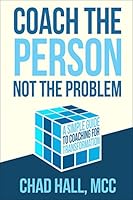# Coach the Person Not the Problem

## Metadata
- Author: [[Chad Hall]]
- Full Title: Coach the Person Not the Problem
- Category: #books
## Highlights
- no other principle makes a bigger contribution to your effectiveness as a coach than this simple concept: coach the person, not the problem. ([Location 75](https://readwise.io/to_kindle?action=open&asin=B01LZB74MD&location=75))
- this style of coaching is built on the assumption that the coach is somehow smarter or more capable of solving the problem than is the client. ([Location 119](https://readwise.io/to_kindle?action=open&asin=B01LZB74MD&location=119))
- The coach is inquiring about the problem, but not in order to gain his own insight or work to solve the problem. Instead, the questions engage the problem-solving capabilities of the client. ([Location 166](https://readwise.io/to_kindle?action=open&asin=B01LZB74MD&location=166))
- the goal of coaching isn’t just to solve a problem but to help the client grow, develop, and even transform. ([Location 189](https://readwise.io/to_kindle?action=open&asin=B01LZB74MD&location=189))
- Transformational coaches ask very different kinds of questions, such as these: What does this challenge stir up inside of you? How do you wish you could experience this? What does this reveal about you? It sounds like maybe a switch needs to flip inside you; what’s the switch? What has to change inside you in order for you to deal with this? Who do you need to be in order to do what you need to do? What new belief (value, strength, assumption, identity) is necessary? How does this change the story you’re living? ([Location 219](https://readwise.io/to_kindle?action=open&asin=B01LZB74MD&location=219))
- help the client live her life out of the transformation she’s experienced. ([Location 247](https://readwise.io/to_kindle?action=open&asin=B01LZB74MD&location=247))
- emotions are data. The client’s emotions can reveal very important information related to deeply held values, attitudes, preferences, expectations, etc. ([Location 294](https://readwise.io/to_kindle?action=open&asin=B01LZB74MD&location=294))
- clients can experience strong emotions in response to something in their past, something that is unresolved and continues to cause pain or sadness. ([Location 302](https://readwise.io/to_kindle?action=open&asin=B01LZB74MD&location=302))
- Why questions can cause the client to think she has to defend or explain herself instead of inviting new awareness. Instead of “Why does this make you sad?” try something along the lines of “What about this stirs up sadness for you?” or “What does your sadness tell you about this?” ([Location 320](https://readwise.io/to_kindle?action=open&asin=B01LZB74MD&location=320))
- The bottom line is that if you only coach your client’s rider (the rational, logical, thoughtful part of who they are) and not their elephant (the emotional, motivational, and core values part of who they are), your client won’t get very far. ([Location 332](https://readwise.io/to_kindle?action=open&asin=B01LZB74MD&location=332))
- Get the client to clearly name the problem early in the session so you aren’t busy trying to figure out what the problem is. ([Location 339](https://readwise.io/to_kindle?action=open&asin=B01LZB74MD&location=339))